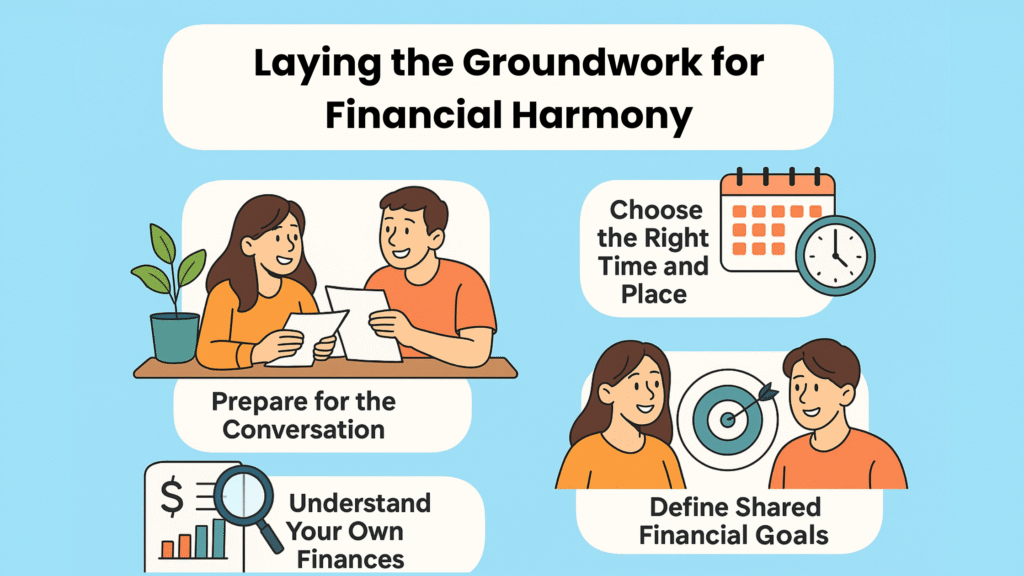Financial conversations are not the most romantic topic, but it’s necessary for couples to have. Money can bring up strong emotions, whether it is determining who pays the bills or whether that fancy vacation is in reach. Deciding how to manage a joint budget or set financial goals together is very crucial for your financial and emotional well-being as a team. However, for many couples, these conversations feel uncomfortable, stressful, or even no-no. As they say, “Money doesn’t buy happiness, but it surely helps to avoid many problems!”
In this post, we’ll walk you through why financial conversations can be tough, how to approach them with confidence, and tips to make financial conversations a habit you actually enjoy.
Why financial Conversations are Important in Relationships
Money is more than just rupee or dollars, it represents our values, goals, and priorities. But when couples avoid financial conversations altogether, it can lead to mismatched expectation, misunderstanding or even hidden debts. In fact, research shows that finance disagreement is one of the leading causes of stress in relationship. By sharing and discussing finance openly, couples can build trust, work as a team, and secured their future together.
Remember, every big financial goal—whether it’s buying a house, starting a family, or retiring early—starts with one simple conversation. You don’t have to have all the answers right away. The key is to start somewhere and keep the dialogue going.
Key Financial Topics Every Couple Should Discuss
Here are some of the non-negotiable topics you must discuss with your partner regarding finance

Saving Goals: Both short term and long term is Important. Short term goals might be planning a vacation or home renovation, while long term goals may be education of children, saving for retirement etc., discussing all these with your partner is essential.
Debt Management: If one or both partners have debt, create a strategy to manage or pay it off. Consider debt consolidation or the snowball/avalanche method.
Spending Habits: Everyone has different spending styles. One partner might be a saver, while the other enjoys splurging. Discussing these habits openly helps set boundaries and avoid conflicts.
Emergency Funds and Insurance: Planning for the unexpected is essential. Build an emergency fund to cover at least 3-6 months of expenses and review insurance policies to ensure you are adequately covered.
Investments and Retirement Planning: Align your long-term visions for retirement. Discuss investment strategies and consider meeting with a financial advisor if needed.
Understanding the barriers to financial Conversations
Before we talk about how to have good financial conversations, let’s understand why it’s difficult for many couples to discuss finances. Recognizing and understanding these barriers can help you approach financial conversations with empathy and patience.
Fear of Judgement: It is difficult to admit financial mistakes. Confessing to your partner about credit card debt or failing to save enough can be daunting. Indeed, it seems scary! After all, nobody wants to feel judged or ashamed, and this fact often serves as a roadblock for most people when it comes to being honest about finances and does not discuss it openly with their partner.
Different Money Habits: It might be that you love saving each penny, on the other hand your partner thinks that life is too short and prefer spending on luxuries. These differing of views can lead to misunderstanding and arguments.
Cultural or Family Influences: Financial habits are hugely influenced by how you were raised to think about the money. If you grew up in a family where they avoided money discussion, talking about it now feel unnatural. On the flip side if you partner was raised with open financial communication, they might expect the same from your side. These differences can create misunderstandings.
Past Financial Mistakes: You may have made some financial decisions that you’re not proud of. Those experiences can make you hesitant to open up. The truth, however, is that avoiding the topic will only make it even more difficult to build trust.
The key is understanding these challenges so that we can tackle them and move forward.
Prepare for the Conversation
Jumping directly into a money talk with your partner without preparation is like cooking without a recipe—it might work, but it’s risky. Unpreparedness can lead to misunderstandings, so take time to get well organized before having the conversation.

Choose the Right Time and Place
Select settings under neutral grounds, comfortable and relaxing for both, calm and casual as well. Avoid having discussions during stressful times, like when bills are due or after an argument. An ideal setting would be a warm, quiet weekend morning or a very easy-going evening spent at home.
Understand your own Finance:
Before the conversation, it is very important to take stock of your financial picture. In doing this self-assessment, one will be able to communicate effectively. Also, ensure to have the freedom of being transparent with each other in discussing income, savings, investments, and debts.
Define Shared Financial Goals
First of all be clear about, what you and your partner want to achieve together. To keep the conversation focused, it is essential to have a common goal, it may be about budgeting, big purchases or even travelling.
Practical Tips for a Smooth Financial Discussion
The way we approach the conversation matters just as much as the content. Acknowledge that money talk can be tricky, and we may feel awkward discussing it. It all okay! Understand that you both are a team and the goal is to work together.
Use “We” Language: Instead of framing the conversation as “your spending” or “my debts”, using inclusive language like “our budget” or “we need to plan, how we can adjust our spendings”. This fosters a sense of teamwork rather than blame.
Be Honest and Transparent: Even though it is unintentional, hiding financial information can erode trust. Be upfront and share all your financial including debts, savings, etc. It’s better to address these things now than letting them to become bigger problems later.
Set boundaries and stay on track: Don’t try to discuss everything in one go. Start small- maybe focus on budget first, and leave other topics for another time. Secondly, it is easy to get diverted to unrelated topics or arguments. If such things happen gently steer back to conversation to the main topic.
Build a Plan Together
Once the groundwork is laid down you need to take action. Here is how you can create a financial plan as a couple:
Create a Joint Budget: Sit down together and list your combined income and expenses. Decide which expenses are shared and which are personal. Make sure the budget leaves room for fun and flexibility!
Divide Responsibilities: It is always recommended to divide the tasks and ensure that nothing is overlooked. Who will handle the bills? Who will manage savings or investments?
Set Financial Priorities: As a team you need to discuss and finalise what is most important for you as a couple. Are you focused on paying off debt, saving for big purchase or building an emergency fund? Having clear priorities will guide your decisions.
Overcoming Challenges and Disagreements
Even the ‘best intention’ usually doesn’t help when discussing financial issues. In what fashion do you treat them with dignity?
Practice Active Listening: When your partner is talking, pay attention and try to understand what your partner is trying to tell you rather than attempting to come up with your response. Reflect back the words and phrases of what he/she said to show you understand.
Compromise Without Resentment: Although compromise is really important; there should be no guilt-feeling here on any partner’s side. All voices should be heard and somehow both should be able to address their concerns
Seek Professional Help When Needed: It is best in some case to involve a financial advisor or counsellor, when discussion becomes heated or complex and you both struggle to get on same page. They can provide neutral guidance and can help you to navigate in such tricky situations.
Continuing Financial talk
One conversation is not enough by itself. Instead, make a habit to sit together again as financial situations and objectives generally evolves over time, so regular check-ins are crucial. It creates forward momentum- makes both accountable and allows for adjustment when necessary.
Schedule Monthly or Quarterly Reviews: Schedule a time suitable for both to review your budget, progress made and discuss any changes.
Celebrate Milestones: Give a pat on the shoulder together when a savings goal is achieved or when debt has been paid off. Acknowledge these achievements together and celebrate it.
Adapt as Needed: Life changes—from new jobs to starting a family—may require adjustments to your financial plans. Stay flexible and open to revising your strategy.
Tip Just think of these check-ins as mini date nights: Order pizza, go over your progress, then celebrate all the wins-like paying off a credit card or sticking to your budget!
Finishing Touch: Strengthening Your Relationship with Financial Transparency
Every conversation about the money truly creates a path that determines the future of a relationship. In such conversations you may find not only financial sensibility but also a bond that transcends these numbers: in which together they become richer by their openness and ambition. Open, honest financial conversations build trust, reduce financial stress, and help turn dreams into a reality for you both together. That initial talk may be a little daunting, but the rewards are great. So, gather your breath, brew up the coffee, and spark that conversation with each other. Your future selves will be grateful.
Ready to take control of your finances as a couple? Share your thoughts or tips in the comments below!




I believe this article will be an excellent plus point and truly helpful for everyone studying this subject. Congratulations to the author, Ashish, and I encourage you to keep writing!
Fantastic brother…Good to know about it..very well explained.Keep going .Best wishes.
This article is very insightful and eye opening. Talking about finance regularly among the family members or even couples is very rare in our society. Discussing regularly helps build understanding and setting shared financial goals is very essential for leading a successful financial journey together.